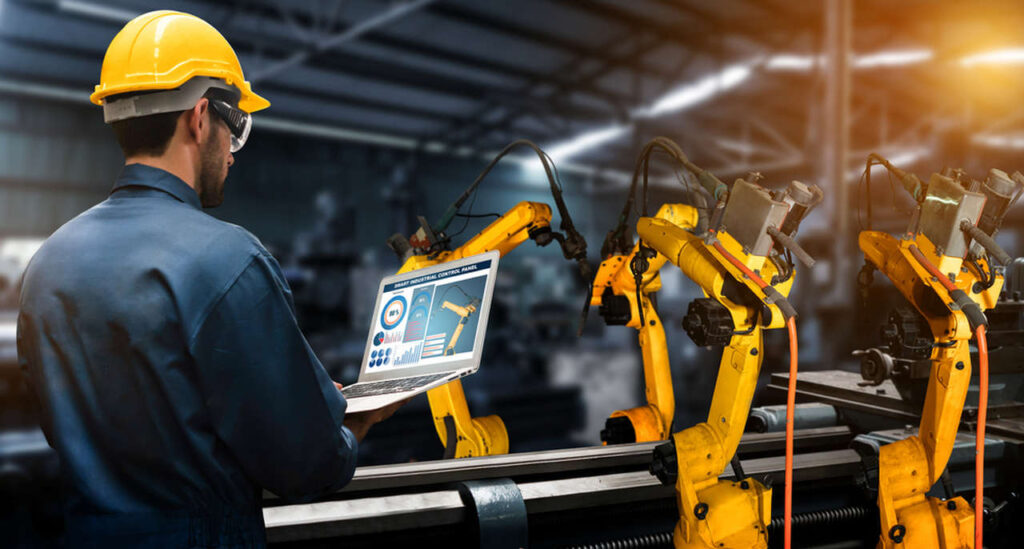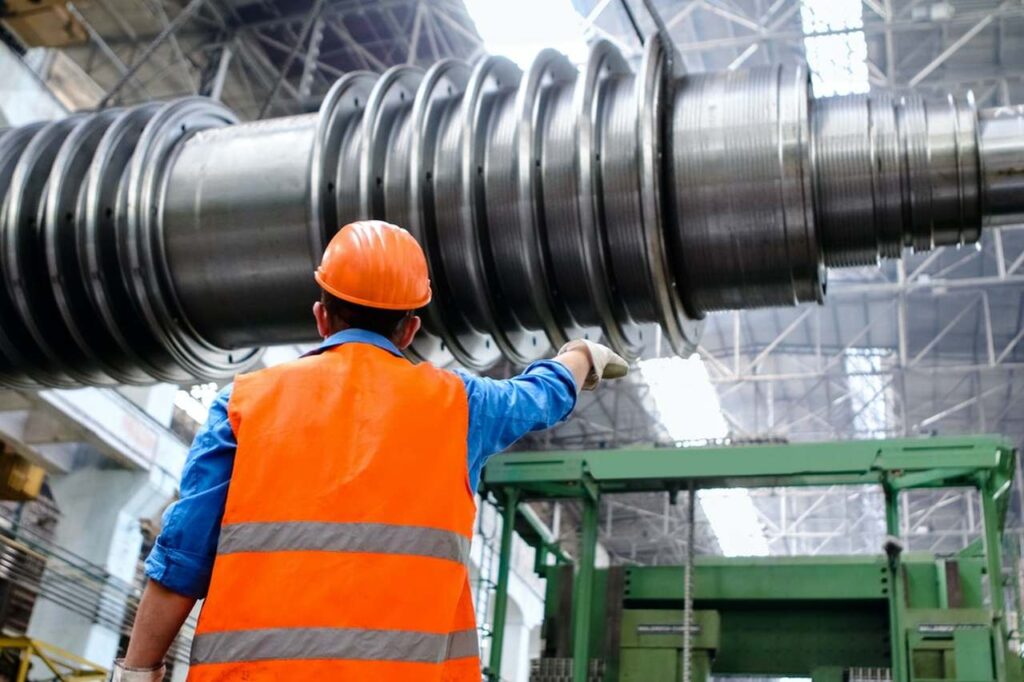IoT in industry is already a reality. The internet of things in the industrial sphere comes to integrate and optimize operations throughout the production chain.
It is another aspect of modernization of the business, as well as professionalization before the regulatory agencies of economic activity.
Check with us what is IIOT or Internet of Industrial Things!
Check out the consulting in accreditation processes of ABNT NBR ISO / IEC 17025:2017 Master Certifications!
IoT in the industry: What is it?
IoT in the industry is the application of the Internet of Things in the industrial environment. And what is IoT? Connectivity between devices and systems that, through sensors, exchange information with each other.
In industry (IIoT), the internet of things unites intelligent machines and advanced data analysis. The goal is to develop more efficient and agile systems that monitor, collect, change, analyze and deliver key data for fast and accurate decisions.

Difference between Iot and IIoT
The only difference between IoT and IIoT is the scope. As you just saw, IoT is connectivity between devices and systems. It can be applied in a residence, an office, and an industry. In the latter case, it would be the IoT in industry (or IIoT).
IoT Benefits in the Industry
Understood the concept of IoT in the industry (or IIOT), we can imagine that it brings many advantages, right? What does IoT bring to the industry? We list below:
- Less costs: One of the benefits of IoT in the industry is the reduction of waste, delays and failures. This improvement in manufacturing processes leads to a reduction in costs, in addition to higher profit. IIoT also informs about the need for maintenance in the machines, reducing the expense of purchasing new equipment.
- Informed decision-making: With the interconnection of the entire manufacturing process, executives can have a lot of relevant data. From the analysis of the information, they have an overview of the performance of the industry and can make better decisions.
- Fewer accidents: remote control of machines, made possible by IoT in the industry, increases employee safety. With less exposure to risk, there are fewer accidents. It is one of the great benefits of IoT in the industry.
- Improved diagnostics: sensors in machines enable detection and analysis of internal and external production factors. This allows for a more thorough analysis of the process.
- Production control: IIoT promotes the communication of machines to the central server in real time. This brings greater control of production from the data provided.
To better understand the benefits of IoT in the industry, you need to know how it applies in practice!
4 IoT applications in the industry
How does IIoT improve production control? As for cost reduction, what does IoT bring benefit to the industry? See examples of IoT in companies in the industrial segment and understand IoT in practice!
Replacement of labor in repetitive processes
Do you know how IoT can influence industrial automation? IoT automation is focused on eliminating repetitive processes, removing the worker from a manual activity and replacing him with machines. This professional can be relocated in a strategic activity.
So IoT in practice can eliminate jobs that don't add value. It is one of the examples of IoT in the day-to-day industry.
Reduction of corrective maintenance
On the shop floor, some corrective maintenance occurs due to inattention or lack of maintenance planning.
When we use IoT in the advanced industry, an intelligent sensor can detect when predictive maintenance should be done.
It is one of the examples of IoT in industrial companies that promote cost reduction. After all, a stopped machine interrupts production, and corrective maintenance is usually more costly.
Monitoring equipment productivity
How can the internet of things contribute to the industry? In several ways, but one of them concerns increased productivity. IoT in practice monitors all manufacturing production and collects data to enable informed decision-making.
With this productivity information, the manager can see, for example, whether he needs more staff, more IoT automation, or other action to improve processes.
Accident prevention
Preventing accidents is one of the most relevant examples of IoT in companies in the industrial segment. After all, we are dealing with the health and safety of professionals. And how is IoT in accident prevention practice?
How about a smart presence sensor to prevent access to dangerous locations? Or a gas detection sensor? Temperature sensors can monitor temperature to prevent accidents with overheated ovens.
These examples of ioT on a day-to-day business can even change the market's perception of your business.
How does IoT work in the advanced industry?
IoT in the advanced industry has several applications. IoT automation eliminates repetitive processes, contributes to equipment maintenance, and more.
It is important to remember that this industry is the introduction of information technology in factories. IoT's focus in the advanced industry is thus developing or improving machines, using them for data collection and analysis, production tracking and other functions.
Therefore, we can cite other examples of IoT in the day-to-day life of the advanced industry, such as:
- Position control, movement and speed of industrial equipment;
- Optimization of production and operations as a whole;
- Monitoring of inbound and outbound information;
- Monitoring of energy consumption;
- Improvements in the area of cybersecurity;
- Inventory control etc.

What gains does Industry 4.0 have from using IoT?
Before understanding the benefits of IoT in industry 4.0, ask yourself: what is the difference between Industry 4.0 and IoT?
As we explain, IoT in industry is the connection between devices on the shop floor. Industry 4.0 uses a variety of technologies to digitize your industrial processes and have more visibility and efficiency. One of these technologies is exactly the internet of things.
Given this, what gains does Industry 4.0 have when using IoT? IIoT enables industry 4.0 to connect devices, data, machines and people to positively impact production.
With this, executives can take advantage of all the benefits we have already cited from IoT in the industry. No for nothing, even in 2017, we already had 86% of the industries deploying Systems, Devices and IIoT solutions.
How can the internet of things contribute to the industry?
The internet of things contributes in many ways to the industry. In Brazil, we already see solutions for inventory control and machine control. There are devices aimed at optimizing operations and monitoring equipment. Even real-time monitoring of the delivery of raw materials already exists!
In a result, IIoT can currently be applied in the production process and in the logistics process. They are solutions to several problems that bring numerous benefits, such as cost reduction and profit maximization.
In the advanced industry, innovative and IoT-based processes must be accompanied by certifications. They are key to ensuring product quality in Industry 4.0.
Check out a little more about The Anatel Certification and talk to a Master Certifications specialist!
Conclusion
IoT in the industry is another step in digital transformation. Using devices and systems connected to each other is to appreciate real-time data collection. Good analysis can lead the industrial manager to more reasoned decision-making.
The result is one: leverage the results of the business!
